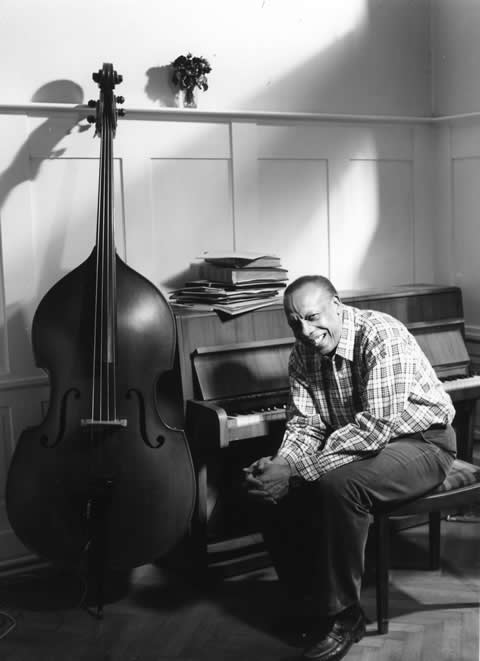Archivo
Lo Nuevo[hide]
Reportes: From The St... : Jazz Plaza ...
Fotos: Tom Ehrlich : Irakere 50th Annivers...
Fotos: Tom Ehrlich : Irakere
Resenas: Joey Altruda Presents: El Gran ...
Reportes: From The St... : Cubadisco 2...
Timbapedia: 09. Interviews -... : Carlos del Pino ...
Fotos: Tom Ehrlich : 2023 Monterey Jazz Fe...
Fotos: Tom Ehrlich : 2023 Monterey Jazz Fe...
Fotos: Tom Ehrlich : 2023 Monterey Jazz Fe...
Fotos: Tom Ehrlich : 2023 Monterey Jazz Fe...
Grupos: Tirso Duarte
Grupos: Tirso Duarte : Discography
Grupos: Charanga Habaner... : 8. El bla bla bla
Grupos: Pupy y los que S... : Tirso Duarte
Fotos Del Día [hide]
Sin Clave No Hay Na
Bebo Joins The Descarga Upstairs
In Memoriam: Bebo Valdés 9 October 1918 - 22 March 2013
 (Photo courtesy Bebo's Facebook profile)
(Photo courtesy Bebo's Facebook profile)
One of the true giants of Cuban music, composer/bandleader/pianist Ramón Emilio Valdés Amaro, whom we all know as Bebo Valdés, passed away on Friday, March 22 in Sweden at the age of 94.
Bebo was born in Quivicán, Cuba on October 9, 1918, slightly less than a month after another key figure in the music, Israel "Cachao" Lopez. Bebo began playing piano at about 7 years of age and entered the conservatory in Havana at age 16. He later began playing piano in the nightclubs of Havana in the 1940s and worked as an arranger in the mid 40s with the great Ernest Lecuona. From the late 1940s to the late 1950s, he was at the Tropicana, and his band, Sabor de Cuba, was one of the groups that regularly backed legendary performers such as Pio Leyva and Beny More. He was also the arranger and pianist for Rita Montaner during that period. In 1960, he went to Mexico for a time where he worked in television and the studios and ultimately settled into a decades-long residency in Stockholm in 1963.
Bebo helped further the development of the Mambo and also created an additional rhythm, the Batanga, which competed with the Mambo in Cuba. He also participated in some of the historic Afro-Cuban Jazz recording sessions commissioned by Norman Granz in the 1950s and was a pioneer in the use of the bata in popular dance music. In the late 1950s, he also made a recording with Nat King Cole. He endured a period of relative obscurity internationally after moving to Europe, but in 1994, the recording Bebo Rides Again (his first album after three decades of mostly playing hotels in Stockholm and mentoring other musicians) helped revive international awareness of him. That awareness spread even further after Bebo's appearance in the 2000 film Calle 54 (a film which absolutely belongs in your collection if you haven't purchased it already) and his 2003 album Lagrimas Negras with Diego El Cigala, which fused Cuban rhythms with flamenco vocals. He went on to win multiple Latin GRAMMYs and GRAMMYs including two for El arte del sabor (2002), one for Lagrimas Negras (2003), two for Bebo de Cuba (2006). His album with his son Chucho Valdés, Juntos Para Siempre, won both a GRAMMY and a Latin GRAMMY award (2009) for Best Latin Jazz Album. In films, he also appeared in 2004's El milagro de Candeal, and more recently, he composed the score for the wonderful film Chico y Rita, which also drew some pieces of its plot from aspects of his life.
In addition to all of his personal musical accomplishments, he is also the founder of an important musical dynasty including his son Chucho Valdés (whose many milestones include his key role in Irakere) and his grandson Chuchito Valdés. The 2009 3-CD set Dinastia Valdés showcases music by all three of them.
His full discography is extensive, and given his work in multiple countries over several decades, we are uncertain as to whether a truly complete one even exists at this writing. We'll close for now by sharing a You Tube clip from Calle 54 posted by the Instituto de Musica Contemporanea in Lima of Bebo and Cachao performing Lagrimas Negras. We chose this particular clip for a couple of reasons: one, it's a beautiful clip; two, there are some parallels between these two men. They were born a few weeks apart, both were classically trained yet also revolutionized both popular Cuban dance music and Afro-Cuban Jazz, both had major career comebacks after periods of being out of the public eye, and (perhaps most noteworthy), both had long lives (Cachao passed at age 89, Bebo at age 94) while pursuing an endeavor that the popular imagination sometimes believes to be an eater of its own young. An interesting coincidence is that Cachao also passed on the 22nd of March in 2008. For today's young musicians, there are lessons here about the value of formal musical education and a lifestyle that doesn't cause your departure before you turn 50.
Goodbye Bebo, and thank you for all that you left us. We would say "Descanse en paz", but our guess is that you are probably already jamming with some of those other cats who came before.






















Great article Bill. Thanks.